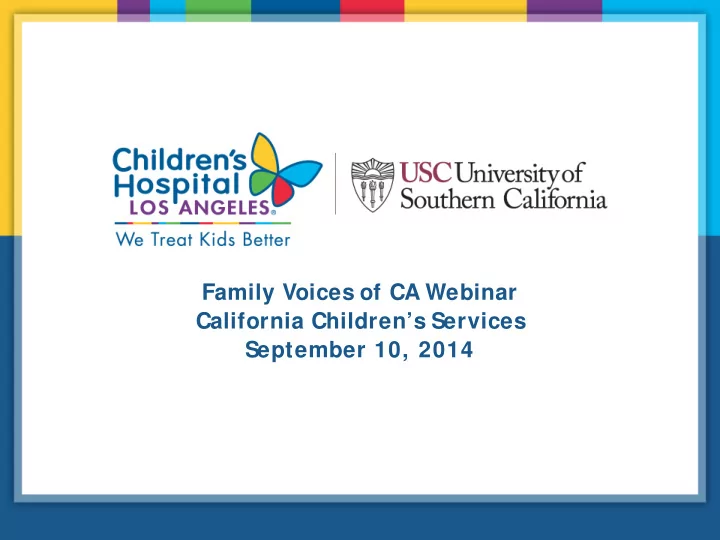

Family Voices of CA Webinar California Children’s Services September 10, 2014
California Children Services CCS is a state wide program that arranges, directs and pays for medical care for children under age 21 who have an eligible medical condition and whose families are unable to pay for all or part of their care. California’s S tate Title V Program for Children with S pecial Health Care Needs
The State’s Role in CCS • Est ablishes and oversees st andards t hroughout t he st at e. • Credent ials or panels individual providers and special care cent ers t o assure a basic level of care. – S pecial care cent ers are comprised of professionals who work as a t eam t o provide comprehensive care for children wit h cert ain condit ions, such as cancers, cardiac disease. – Ut ilizes healt h care professionals wit h special expert ise in t he t reat ment of children. – Providers must meet t he part icipat ing st andards and be approved by t he st at e CCS program t o be on t he CCS panel.
The State’s Role (con’t) • Manages the program in the smaller counties (called dependent counties), from regional offices. Larger counties (called independent counties), like Los Angeles, administer their own program but must adhere to state standards regarding eligibility, provider paneling, payments, etc. • Reimburses providers- 37.5% more than Medi-Cal rates on a fee-for-service basis.
Special Care Centers • Provide comprehensive, coordinated health care to children in the CCS program, organized around a specific condition or system • Multi-disciplinary and multispecialty • Responsible for developing a family centered plan of care to facilitate timely, coordinated treatment • Examples include spina bifida, craniofacial and cleft, cystic fibrosis, heart transplant • Required team members vary by condition • Centers can be found at http:/ / www.dhcs.ca.gov/ services/ ccs/ scc/ Pages/ S CCType.aspx
The Counties’ Roles in CCS • Establishes eligibility (financial, medical, residential) • Authorizes services- all services MUS T be preauthorized • Provides care coordination- facilitate referrals between relevant providers, with community based entities, school districts, regional centers and more, to assure comprehensive care
CCS Services CCS may pay for or provide services relat ed t o t he medically eligible condit ion : • Doctor’s visits • Hospital care • Physical and occupational therapy • Laboratory tests and X-rays • S pecial medical equipment • Medication
CCS Program Eligibility To be eligible, a child must: • Be under the age of 21 • A resident of the county in which they apply • Be financially eligible • Have a medically eligible condition (eligible conditions can be found at: http:/ / www.dhcs.ca.gov/ services/ ccs/ Pages/ medicaleligibility.aspx
Residential Eligibility • The child must be a permanent resident of California (does not need to be legally documented, but must show intent to reside, such as a rent receipt or a utility bill)
Financial Eligibility • The child has a family income of less than $40,000 (adj usted gross income on state tax form), or the child is eligible for Medi-Cal or the family’s out-of-pocket expenses for the child who qualifies is expected to be more than 20% of the family income.
Case Management • CCS also provides case management or care coordination and family support services to eligible children. • Case management or care coordination may be provided by nurse care managers and social workers in the county programs, or within the hospital special care centers.
Therapy Services • Therapy services (at the Medical Treatment Units- MTU’s, located on public school campuses) – Physical and occupational therapy services – In some areas, social work services and nurse case managers are also provided at the MTU’s
Key Challenges • Care is provided related to the specific eligible condition, hence no “ whole child” focus. Can lead to confusion for parents about which payer is responsible for what care • In some cases, lack of coordination with community based or non medical services • Future direction of the program at the end of the carve out from Medi-Cal managed care • Payer of last resort and implications for families
Resources • http:/ / www.dhs.ca.gov/ pcfh/ cms/ ccs/ • http:/ / www.lapublichealth.org/ cms/ ccs/ • kasmith@ chla.usc.edu
Recommend
More recommend